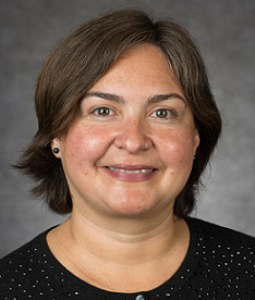
Susana S. Martínez
Coming of Age(ncy) on the Migrant Trail: Central American And
Mexican Adolescent Journeys in Contemporary Young Adult Literature
STRC Faculty Research Fellowship
View Bio
Coming of Age(ncy) on the Migrant Trail: Central American And Mexican Adolescent Journeys in Contemporary Young Adult Literature examines youth migration as a transnational social justice issue that brings visibility to characters who are rarely depicted as having agency. As protagonists who come of age on the migrant journey and gain critical awareness of the dangers they face, their stories not only represent real life experiences to a more privileged U.S. readership, but they challenge us to rethink politicized narratives that only portray poverty and violence while erasing the U.S. role in destabilizing the communities they flee. Young Adult (YA) Literature is a booming industry with a growing area of scholarship, but it has largely ignored Latinx voices. This book project thus provides a roadmap for how YA literature and the humanities can engage complex issues such as immigration and youth agency to address the histories and contemporary structures of racism, while filling a gap in the YA field, Latin American, and Latinx Studies by focusing on the representation of undocumented Central American and Mexican migrants. The book will attest to the power of youth agency and storytelling to create empathy across differences which can ultimately lead to healing, restoration, and social transformation.
Chernoh Sesay, Jr.
Black Boston and the Making of African-American Freemasonry:
Leadership, Religion, and Fraternalism in Early America
STRC Faculty Research Fellowship
View Bio
This book project,
“Black Boston and the Making of African-American Freemasonry: Leadership, Religion, and Fraternalism in Early America,” examines the social, political, and religious contexts that shaped and were shaped by the first two generations of African-American Freemasons in Boston, Massachusetts. This investigation addresses an interpretive problem intrinsic to understanding both early Black Freemasonry and the transition of African-Americans from slavery to emancipation in the northern states during and just after the American Revolutionary Era. Did Black Freemasons successfully demand freedom and independence, or did they adopt a naïve political and cultural strategy of respectability and assimilation? This project reconciles and moves beyond this analytical impasse by showing how organized Black abolitionism coalesced earlier than previous studies have shown, and that it framed and mirrored four major historical contexts: the politics of northern emancipation, the rise of free Black leadership, the spread of African-American Christianity, and an emergent tradition of public Black writers. Examining early Black Freemasonry speaks to scholars in African-American history, Africana Religious Studies and Early American History. It explores the significance of events like the American Revolution; it brings new evidence and insight to the intersection of mobility, religion, class, politics, and gender within Black politics; and it provides new analysis of Black abolition from the late eighteenth century to the early nineteenth century. The understudied history of early Black Freemasonry brings to light a vital component of understanding how Black people shaped democracy and made America. These early Black leaders were unequivocal influencers for social justice, and their story must be told.
Lori Pierce
DNA Forensics and Genealogy
STRC Professional Development Fellowship
View Bio
Dr. Pierce, a historian of race and racial thinking, will use the six-month professional development fellowship to deepen and broaden her understanding of the science of race in the post-genomic era, reaching beyond her training as a historian to the sciences (biology) and social sciences (anthropology) to understand current approaches to racial delineation. Her guiding question for her fellowship will be, “How can scholars in the humanities use the modern science of DNA as an anti-racist tool that challenges racial essentialism?” During her fellowship, she will explore two subjects that illustrate the legacy of race in the age of genetics: the use of DNA in forensic analysis in the criminal justice system and direct to consumer (DTC) DNA ancestry testing. In each case, DNA has been used to support liberatory projects for African Americans. But each case also reveals how racism based on biological essentialism is being recapitulated. For example, the Innocence Project has used DNA evidence to exonerate 365 people who were wrongfully convicted. But DNA has also been used as a form of surveillance. Direct-to-consumer (DTC) DNA testing presents a similar dilemma. Companies such as 23andMe used DNA samples to provide customers with a calibration of their ancestry. But the results are based on broad generalizations about populations and statistical estimates that compare the consumer to a likely reference group. The estimates, presented as objective statements of fact, can reinforce racial essentialism. But DTC DNA testing is also a powerful tool in genealogical work done by families, communities and scholars.
Lourdes Torres
Toward a History of LLEGÓ
STRC Professional Development Fellowship
View Bio
This six-month professional development fellowship will allow Dr. Torres, a sociolinguist, to delve into archival historical research to support a new project that will document the history and significance of the first national LGBT organization for Latino/as, the National Latino/a Lesbian, Gay, Bisexual & Transgender Organization (LLEGÓ ). LLEGÓ ran for almost twenty years and folded in 2002, and though it had a huge impact on Latino/a LGBT organizing, there is currently no scholarly monograph attesting to its rich history, its many contributions, and its ultimate demise. Histories of racial and ethnic gay and lesbian communities and activist organizations are necessary to expand the gay and lesbian historiography by explicitly articulating how race and ethnicity shape this vibrant history. The project addresses this gap in the literature by documenting the history of LLEGÓ and explaining its significance as the first and only national organization LGBT organization advocating for Latino/as. A major focus of the project involves telling the story of an inspiring group of gay, lesbian, and transgender Latino/a activists who recognized that their community’s needs were being ignored and rallied to impact that reality (at a time of LLEGÓ’s founding in the 1980s, HIV/AIDS were ravishing poor and queer people of color).